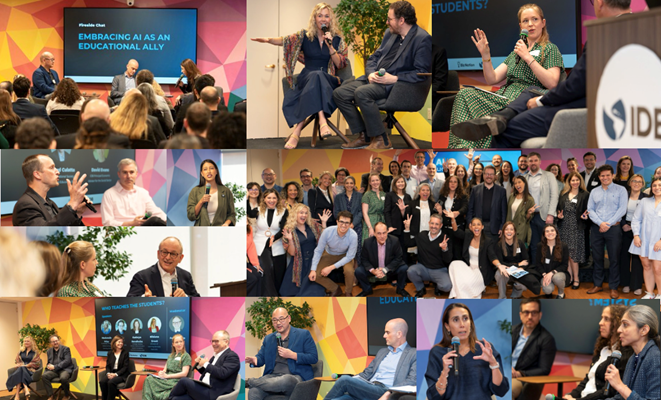What comes to mind when you hear the words “artificial intelligence”? When we posed this question to students at two public schools in Colombia, their answers ranged from giggles to thoughtful silence—and one unforgettable response:
“AI is like a unicorn-duck. It doesn’t exist. It’s just something made up on computers or phones.”
Watch the video: “AI in the Classroom: Voices from Rural and Urban Colombia”
Her words captured something that many students across Latin America and the Caribbean are feeling: AI may be a hot topic, but it still feels distant – mythical, even. Yes, it’s making its way into classrooms, but it hasn’t yet taken root in education systems across the region.
Without Access, There’s No Transformation
While AI adoption is moving fast in other parts of the world, Latin America and the Caribbean face a more basic challenge: access. In the U.S., nearly 40% of young people were already using generative AI tools by late 2022 – a much faster uptake than for the internet or computers.
In the region, 1 in 10 students still doesn’t have a computer at school, and 2 in 10 lack internet access. This digital divide makes it hard to integrate AI into classrooms meaningfully. Compared to OECD countries, where more than 90% of schools have internet for learning, the gap is clear. The truth is, reliable internet, electricity, and devices remain out of reach for many schools in our region, making it impossible to unlock AI’s full potential. That’s why our new publication urges a realistic approach: drawing on decades of experience, it provides a roadmap to help countries harness AI responsibly and equitably.
Turning AI into Real Opportunity
Even as AI unlocks new possibilities, we must ask: Who truly benefits? Can rural students without internet benefit as much as their urban peers? Are we training teachers well enough, not just buying tech? Are we protecting students’ data as carefully as we protect their safety?
These questions brought global experts and regional leaders together for the event “AI & Education: Challenge Accepted!” hosted by the IDB. This was more than a conference – it was a call to rethink how AI can build inclusive, future-ready education systems in Latin America and the Caribbean.
The Carvajalino Sisters, three young entrepreneurs and co-founders of The Biz Nation, opened the event with an inspiring talk about empowering thousands of young people across Latin America and the Caribbean through skills and innovation. Throughout the event, speakers highlighted that AI could help personalize learning, make education systems more efficient, and support decision-making, but it should complement teachers, not replace them. Some of the key takeaways from the event included:
- Equity comes first. Without equity, there is no true digital transformation. The lack of reliable internet, devices, and even electricity in many public schools across the region threatens to leave millions of students behind. Building up basic infrastructure is the first step.
- Teachers must be at the heart of the strategy. AI should enhance, not replace, educators. Innovative models like Alpha School, 2-Hour Learning, and Minerva University show how AI can help optimize learning time, while tools created by organizations like Eedi and Stanford University’s National Student Support Accelerator emphasize the importance of keeping teachers at the center – guiding, supporting, and connecting with students.
- Clear policies are critical. Countries need strong regulatory frameworks, robust student data protection, and public policies that align with their education goals. System-level strategies like Uruguay’s EduIA Lab and Brazil’s Gestão Presente program with Letrus provide practical roadmaps. These examples show that meaningful AI integration doesn’t start with the newest tools, but with thoughtful public investment and comprehensive data policies.
A Long-Term Vision Is Essential.
With the rapid pace of AI development, education systems need to do more than react – they must anticipate. This means aligning education with labor market trends and fostering digital literacy, critical thinking, and adaptability. Programs like PowerSchool in the United States and Stemi in Croatia are leading examples of how AI solutions and public-private partnerships can better connect schools with the skills that industries need.
- AI should be a catalyst for deeper learning, not just a shortcut for routine tasks.
Adopting AI must be guided by principles of inclusion, ethics, and responsibility, helping develop digital citizens who can strengthen their communities, engage in respectful dialogue, and shape public policy. In this spirit, ISTE is redefining digital citizenship, showing that we must move beyond traditional fear-based approaches and focus on empowering responsible, proactive use.

Watch the event here and view the full photo album
The Road Ahead
One student described AI as a unicorn-duck – something imaginary. But AI is already here. How we make it real, fair, and useful for everyone is what matters. At the IDB, we’re committed to helping countries across Latin America and the Caribbean use AI to expand access, improve outcomes, and close gaps. This event was just the beginning of a vital conversation. The real challenge isn’t whether we embrace AI, but how we do it and who we bring along.

Download the report, read our EduAI Focus series, follow us on social media, and share your ideas – we’re just getting started.


Leave a Reply